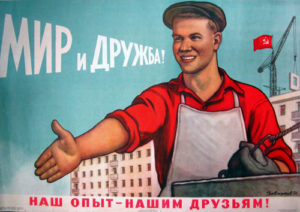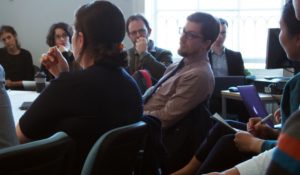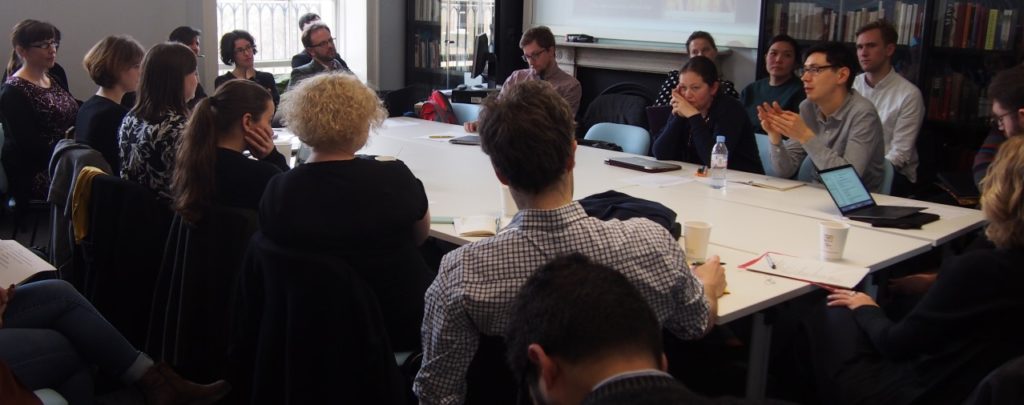 On February 3rd over twenty researchers gathered at Birkbeck to discuss the history of socialist internationalism during the Cold War, a field which has seen increasing scholarly interest over recent years and which has been of particular interest to the Reluctant Internationalists project.
On February 3rd over twenty researchers gathered at Birkbeck to discuss the history of socialist internationalism during the Cold War, a field which has seen increasing scholarly interest over recent years and which has been of particular interest to the Reluctant Internationalists project.
As Johanna Conterio (Birkbeck) explained in the introduction to the conference, recent historiography has complicated traditional images of the Cold War as a period of blocked mobility, revealing the extent of cooperation and exchange both behind and beyond the Iron Curtain. The conference aimed to discuss these patterns of mobility, promote dialogue between Soviet and East European historiographies, and explore the global dimensions of socialist exchange.
The first panel focused on culture within and beyond the socialist world. Kristin Roth-Ey (SSEES) questioned the traditional focus on the exchange of high culture in the socialist world, arguing that it was less important than the objects of mass culture – Bollywood musicals, Latin American melodramas, radio broadcasts and the press – which circulated between the Soviet Union and the Third World. Soviet cultural production, like its technology and industry, was dominated by the ‘aesthetic of the big’, and it was through this mass culture that ideas about the Second and Third Worlds were exchanged. Paul Betts (Oxford) introduced material from a forthcoming photo exhibition organised by the Socialism Goes Global project on Tito’s diplomatic missions to Africa. Official images of Tito on safari, signing trade deals, watching traditional dancers and opening new hospitals presented an aesthetics of equality, highlighting the fraternal mixing which supposedly characterised relations between Yugoslavia and socialist-leaning Africa, in contrast to the racial hierarchies of the former imperial powers. Simon Huxtable (Loughborough) discussed Cold War television as a transnational phenomenon. Intervision, the Eastern Bloc’s broadcasting organisation, was designed as a vehicle for socialist internationalism, promoting programmes such as the Intervision song contest. But while viewers in Eastern Europe were exposed to programmes from the Soviet Union and other socialist countries, they also had access to western programming, in some cases broadcast directly from the West, in others cases purchased or copied by socialist broadcasters. Intervision thus created a broader space of socialist identity, while at the same time introducing Polish viewers to Sesame Street. Katarina Lichvarova (Courtauld Institute) discussed Soviet avant garde art movements, using the Dvizhenie group to explore the circulation of ideas and exhibitions both within the Eastern Bloc and across the Iron Curtain. Dina Fainberg (City University) concluded the panel by showing how Soviet journalists presented the US counter-culture protests of 1968 as evidence of the growing hold of socialist values. Appearing alongside reports of the Soviet intervention in Prague, however, these accounts lent themselves to subversive readings and risked undermining the notions of socialist international community they were intended to promote.
 The second panel shifted focus to trade and exchange. Alessandro Iandolo (Oxford) used relations between the Soviet Union and Ghana in the early 1960s to explore the role of development cooperation in Cold War socialist internationalism. Soviet attempts to promote a model of economic development based on industrialisation and mechanised agriculture appealed to the Ghanaian government, which was keen to gain support for its hydroelectric and infrastructure projects, but were met with suspicion from the former imperial powers in West Africa. Kristy Ironside (Manchester) discussed the difficulties in comparing money and prices in the communist and capitalist worlds. Soviet officials systematically drove down prices for everyday goods from the early 1950s, but were frustrated by their inability to promote these achievements to the rest of the world because of the difficulty of translating socialist economic indicators to western price models. Katarzyna Jezowska (Oxford) showed how the Polish pavilion at the 1956 Damascus trade fair was designed to convey a specific sense of socialist modernity, using modernist aesthetics and technological innovation to promote the achievements of Polish reformers. Yakov Feygin (Pennsylvania) examined the history of ‘mathematical internationalism’ – economic experts in both socialist and capitalist economies united by a belief in the power of maths and computing to secure economic development. The diplomatic thaw of 1967 created a space for Soviet experts to participate in international exchanges on economic reform and development, but their attempts to introduce markets and elements of supply and demand into the Soviet economy broke down in the early 1980s.
The second panel shifted focus to trade and exchange. Alessandro Iandolo (Oxford) used relations between the Soviet Union and Ghana in the early 1960s to explore the role of development cooperation in Cold War socialist internationalism. Soviet attempts to promote a model of economic development based on industrialisation and mechanised agriculture appealed to the Ghanaian government, which was keen to gain support for its hydroelectric and infrastructure projects, but were met with suspicion from the former imperial powers in West Africa. Kristy Ironside (Manchester) discussed the difficulties in comparing money and prices in the communist and capitalist worlds. Soviet officials systematically drove down prices for everyday goods from the early 1950s, but were frustrated by their inability to promote these achievements to the rest of the world because of the difficulty of translating socialist economic indicators to western price models. Katarzyna Jezowska (Oxford) showed how the Polish pavilion at the 1956 Damascus trade fair was designed to convey a specific sense of socialist modernity, using modernist aesthetics and technological innovation to promote the achievements of Polish reformers. Yakov Feygin (Pennsylvania) examined the history of ‘mathematical internationalism’ – economic experts in both socialist and capitalist economies united by a belief in the power of maths and computing to secure economic development. The diplomatic thaw of 1967 created a space for Soviet experts to participate in international exchanges on economic reform and development, but their attempts to introduce markets and elements of supply and demand into the Soviet economy broke down in the early 1980s.
The third panel explored models of socialist development, focusing particularly but not exclusively on medicine, urban planning and the environment. Kate Lebow (Oxford) presented her research on the memoir-writing competitions organized by Polish sociologists among workers and peasants in the interwar period, which unveiled, among other things, a number of assumptions about the place of home and homeland in global networks, and about rights and justice, in personal narratives. Timothy Nunan (Freie U, Berlin) used the case of the Afghan regime of the 1980s to explore the overlap between socialist and Islamist internationalisms. Rather than making a distinction between the two, Afghan socialists argued that they were also Islamists. Although socialist internationalism was important to them, it also acted as a bridge to wider debates about anti-imperialism and pan-Islamism. Robert Balogh (Budapest) explored Hungarian forestry research into Scots pine, showing how experiments into agricultural, industrial and environmental aspects of pine cultivation circulated between Eastern Europe, Western Europe and international organisations such as the FAO. Jo Laycock (Sheffield Hallam) examined the complex network of non-governmental actors, governmental administrators and recipients of relief and their interactions in post-genocide Armenia. Dora Vargha (Exeter) concluded the panel with a discussion of the polio vaccination campaigns of the 1950s and 1960s, which developed at the intersection of liberal internationalism, international scientific networks, and socialist internationalism. The socialist world was seen as the perfect place to carry out global vaccination trials because of the nature of socialist health system, while international experts argued at the same time that there was ‘no Cold War’ in the fight against disease.
The fourth panel continued discussions about the global spread and reach of socialist projects. James Mark (Exeter) discussed changing representation of Cubans in Hungary through photographs and photo journalism, where he detected a shift from Cubans being portrayed as heroes to featuring as poor workers on the periphery. Tobias Rupprecht (Exeter) explored the East European fascination with global forms of free-market authoritarianism in the late 1980s and early 1990s. For many reformers across the region, he argued, ‘the West’ was not the only source of inspiration; economically successful dictatorships as Chile, South Korea and Singapore also provided crucial lessons. Ana Antic (Exeter) talked about Yugoslav psychiatrists’ technical aid missions to Guinea in the 1960s, and considered the extent to which they contributed a Marxist perspective to transcultural psychiatry. Psychiatrists’ discussion of African ‘primitivism’, she pointed out, mirrored their perceptions of ‘primitive’ patients in Yugoslavia itself.

